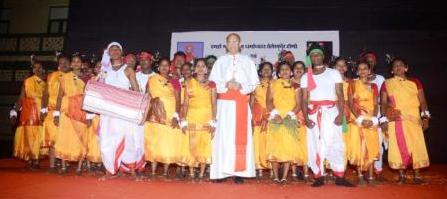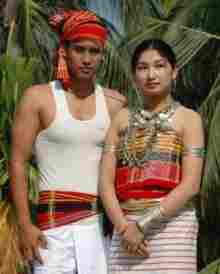India voted in favour of the United Nations Declaration on the Rights of Indigenous Peoples on the condition that after independence all Indians are indigenous. Therefore, it does not consider the concept of “indigenous peoples”, and therefore the UNDRIP, applicable to India.
In India, there are 705 ethnic groups officially recognized as “Scheduled Tribes,” although there are several ethnic groups that are also considered Schedule Tribes, but are not officially recognized.
The Covid 19 restrictions did not hamper the observance of the International Day of the World’s Indigenous Peoples throughout India, with several online events led by various Church organisations, on their own or in collaboration with likeminded civic groups.
In his morning Mass online, the Archbishop of Bombay (Mumbai) Cardinal Oswald Gracias set the tone , mentioning Pope Francis’s Amazon synod and Fr Stan Swamy, who gave his life for the cause of India’s indigenous people.
The cardinal observed that “challenges faced by Indigenous people in South America were similar to the challenges faced by Tribals in India”.
Card Gracias also spoke about Fr Stan Swamy, who gave his life for indigenous tribes in India, and mentioned the men and women religious who work among the Adivasis (India’s tribal people):
“We are present in Bihar, Chotanagpur and Raighad, to give them hope, education, dignity and a future,” he said. “But tribes around the world suffer injustice and exploitation.”
In Northeast India, Bishop George Pallipparambil of the Miao Diocese in east Arunachal Pradesh told his flock that Indigenous Day is a reminder to revive the age-old traditional values of the indigenous people.
“It is not about some important events to mark the day, but it is a call to revive the golden values of our traditional societies, respecting the elders, values of family life, and to understand the importance of our communion with nature and caring for the earth”, said Bishop George at the backdrop of a small function held at Newman School Neotan to mark the World Indigenous Day 2021.
The International Day of the World’s Indigenous People is observed every year on 9 August to raise awareness and to protect the rights of the indigenous people.
Reminding the students on the importance of learning the mother tongues and being proud of their tribal identity, the Salesian prelate said, “Indigenous Day is a significant occasion to get back to our roots to preserve our unique tribal identity.”
Congratulating the school management for encouraging the students to wear their traditional attire, the Bishop said, “Let us not lose our rich tribal identity due to modern technical advancements or to outside invasion. Each of us should not only preserve it but also promote it.”
Wanglung Mossang, a local dialect promoter of Arunachal Pradesh said, “As indigenous people, we must mark this day and celebrate it every year in order to cling on to our own inherited qualities of love and brotherhood and sharing and caring at is used to be in the days of the old”.
Meanwhile, in Tripura State, The International Indigenous peoples Day was celebrated at Sorojini Tea garden at Jamtailbari in Unakoti District.
People from Oraon, Munda, Kharia and Santal tribes participated in the August 9 program organized by All Adivasi Students Association, Tripura (AASAT), a two-year-old initiative of the Salesians in Tripura among the college students.
Mervar Kumar Jamati, the state’s Tribal Welfare minister, the chief guest, encouraged the audience to foster unity and eschew ills such as alcoholism and drugs abuse.
During the week beginning Sunday 8 August, the CBCI has been holding webinars to mark the International Day of the World’s Indigenous Peoples, noted Fr Nicholas Barla, executive secretary of the CBCI Tribal Affairs Committee.
For Fr Nicholas Barla, an ethnic tribal Oraon from Odisha, the measures included in various development plans fail to meet established goals. In his view, governments and stakeholders should not leave anyone out from development.
“ On paper, the Constitution guarantees the rights of tribal people; in practice, however, their land rights are not recognised” by the authorities, he stated.
What is more, “Development projects take place without the participation of the tribes who are not getting any benefits”.
Corporate plans, the priest said, are a source of distress for tribal communities, who end up displaced, with climate change compounding their misery.
“The Catholic Church strongly believes in development for the poor and marginalised, without any distinction, because Jesus himself taught us to be in their service,” says Auxiliary Bishop Theodore Mascarenhas of Ranchi Archdiocese in Jharkhand state.
The challenge for Indigenous rights advocates in India is the historically accepted view that all Indians are Indigenous.
*Adivasi Asmita: The Dignity and Self-Pride of Indigenous peoples.





Interesting report. Position of Indian government is actually to deny the unique identity and aspirations of tribes in India